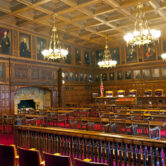SAN DIEGO (CN) — The First Amendment doesn't protect Californians who honk their car horns in support of street protests, or for any other reason besides alerting other drivers of safety concerns on the road, a divided Ninth Circuit panel ruled Friday.
In 2017, Susan Porter participated in a protest outside of Congressman Darrell Issa’s office in Vista, California, over Issa’s support of former President Donald Trump and his policies. After noticing police handing out parking tickets, Porter left the protest to move her car but returned to find the protest over.
On her way home, Porter honked her car’s horn 14 times in short clusters of beeps to show her support of the protesters. That’s when a San Diego County Sheriff’s deputy pulled her over and gave her a ticket for misuse of a car horn — a 1913 law bans the use of a horn for anything other than warning other drivers.
The officer didn’t show up for court and the ticket was dismissed. Porter then sued to halt future enforcement of the car horn law, arguing that it violates both the First Amendment freedom of expression and the 14th Amendment. Besides political speech, Porter said honking could also be used to “greet friends or neighbors, summon children or co-workers, or celebrate weddings or victories.”
A federal judge sided with the state of California, and on Friday a divided Ninth Circuit panel did as well. Writing for the panel, U.S. Circuit Judge Michelle Friedland said there are plenty of other ways to show your support for protests than by honking your horn.
"Section 27001 plainly leaves open ample alternative channels for people to communicate their ideas and messages, including from their cars. Porter argues that Section 27001 prevents spontaneous communication by drivers about protests or other events, but common sense and Porter’s own testimony indicate otherwise," Friedland, a Barack Obama appointee, wrote for the panel. "As Porter herself has done on numerous occasions, drivers can park their cars and attend political demonstrations on foot. They can also express agreement with protesters from their cars by waving, giving a thumbs up, or raising a fist as they drive by. They can put bumper stickers on their cars."
The panel noted — though declined to address — horn-honking citations are exceedingly rare and that officers are taught to use "sound professional judgment," which could, as U.S. Circuit Judge Marsha Berzon pointed out in her dissent, lead to selective enforcement.
Berzon also blasted the lower court's reliance on expert testimony by California Highway Patrol Sgt. William Beck. Beck said that car horns can startle and distract drivers and, if they’re used indiscriminately, can “dilute the potency of the horn as a warning device.” Berzon said Beck's testimony and the examples he gave amounted to opinion, not scientific fact.
“In none of these examples did Beck report any actual danger created by the honk. And, in any case, those examples were based on Beck’s personal experience, no different from anyone else’s experience with horn honking and so unrelated to any ‘scientific, technical, or other specialized knowledge’ or experience,” Berzon wrote.
Plus, Berzon added, the point of a protest is to make noise to call attention to a cause or an issue — making it a free speech issue.
“A political protest is designed to be noticed. As Deputy Klein testified, 'it was loud.' Political honking was hardly a significant source of noise or distraction in that environment. There is no basis for supposing that anyone was confused or distracted by the honking. Instead, Porter’s honking was understood as political expression by the protesters, who cheered in response,” Berzon wrote.
If Porter simply waved or gave a thumbs up to the protesters, like the majority suggested, she would be putting herself and other people in even greater danger because that would require a driver to take at least one of their hands off the steering wheel, Berzon added.
Porter's attorney David Loy, legal director of the First Amendment Coalition, said they may request an en banc rehearing or take the case to the U.S. Supreme Court.
“I think this is a core First Amendment issue. People do this every day,” Loy said. “This is a significant cutback on the exercise of core free speech rights.”
"Today’s decision addresses the constitutionality of California Vehicle Code Section 27001 (Audible Warning with Horn). Sheriff's Deputies use discretion and their best judgement when enforcing the laws of the state of California and we appreciate the court's consideration and the resultant decision in this case," wrote San Diego County Sheriff Kelly Martinez in a statement.
Senior U.S. District Judge Edward Korman, a Ronald Reagan appointee sitting by designation from the Eastern District of New York, rounded out the panel.
Subscribe to Closing Arguments
Sign up for new weekly newsletter Closing Arguments to get the latest about ongoing trials, major litigation and hot cases and rulings in courthouses around the U.S. and the world.









